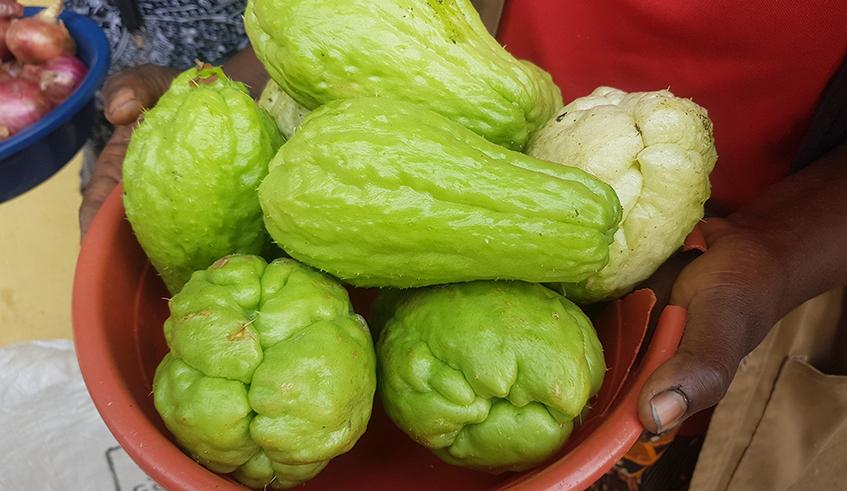Africa-Press – Sierra-Leone. Chayote, locally known as ‘bishayote’, is a type of squash that belongs to the gourd family, often referred to as a vegetable, but technically the bright, green pear-shaped food is a fruit. According to vendors, five to six pieces of chayote go for Rwf 500 to 1,000 depending on where you buy them. They are also prepared alongside other vegetables.
If you’re looking to experiment with interesting new fruits and veggies, nutritionists say chayote is a smart choice.
This is a nutritious food that contains several vitamins and minerals such as folate, vitamin C, and is an excellent source of fibre.
The good thing about chayote is that it’s versatile, easy to use, and provides a boost of healthy nutrition along with an interesting flavour and texture.
Nutritionists say chayote should be peeled and can be eaten raw or cooked, and you can use it instead of squash in some recipes. It can also be diced and added to fresh salads.
Health benefits
Rene Tabaro, a nutritionist and dietician at King Faisal Hospital, says chayote is loaded with an array of nutrients and antioxidant compounds that provide many great health benefits.
He says one of the greatest attributes of chayote squash is its nutrition content, as it offers various essential vitamins, minerals, and fibre. Notably, he says chayote is particularly high in folate, which promotes proper cell division.
Tabaro says it is indicated that most of the calories in chayote come from carbohydrates.
For instance, there are a total of six grams of carbs in a one-cup serving and over two grams of healthy fibre. You’ll also get a small amount of starch and just over two grams of naturally occurring sugar.
“Chayote is a low-glycaemic food. The glycaemic load of a single cup serving is estimated to range between one and two, regardless of whether it is cooked or raw,” he says.
He notes that low glycaemic food is digested and metabolized slowly and, therefore, raises blood sugar at a slower rate than foods with higher glycaemic indexes. It is also known that chayote provides a number of health-boosting vitamins and minerals. A single serving of chayote provides 123 micrograms of folate or 31 per cent of the recommended daily intake. One will also get over 10 grams, or about 17 per cent of the recommended intake of vitamin C.
Other vitamins in chayote include vitamin K, vitamin B6, pantothenic acid, thiamine, riboflavin, niacin, and vitamin E.
Together with its nutrient density, Dieudonne Bukaba, a Kigali-based nutritionist, says chayote also happens to be low in calories, fat, sodium, and cards.
As such, he says it’s quite healthy and makes for a good fit for various diets. He goes on to note that many of chayote’s benefits may be attributed to its antioxidant content.
“Antioxidants are compounds found in a variety of foods that protect against cellular damage, reduce inflammation, and lower stress within the body,” he says.
Like many other types of squash, Bukaba says chayote is a good source of fibre. Fibre helps you to feel full and satisfied after eating so that it is easier to maintain a healthy weight. Fibre is also an important nutrient for a healthy digestive system. Studies have also established the use of chayote and chayote roots as a quality source of both starch and fibre.
For More News And Analysis About Sierra-Leone Follow Africa-Press






